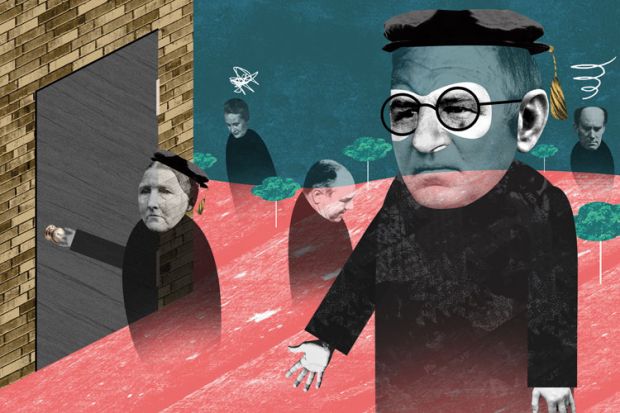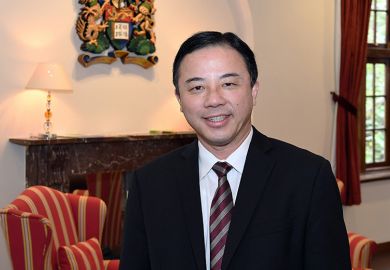It is a well-known joke that old professors don’t die, they just lose their faculties. But a recent informal survey we conducted suggests that it could be supplemented by the much less amusing: “professors emeriti don’t die, they just become invisible.”
Without claiming the rigour of representative sampling, we solicited views on the visibility of professors emeriti from colleagues at 14 universities – civic, plate-glass, federal and modern – across England, Scotland and Wales. We discovered that there is no uniformity regarding the rights, duties and privileges of professors emeriti even within a single university. There is no generic expectation regarding their continuing involvement in university life, and there is no standard package (comprising, for example, library access, email address and shared office provision) for those who wish to remain involved. In most instances, individual deals have to be agreed with heads of department or deans regarding duties, access to facilities and payment for any work that is not done on a pro bono basis.
This ad hoc approach gives rise to a lack of transparency and scope for inequitable treatment. Invitations to participate in departmental activities and attend public lectures or degree ceremonies, for instance, are distributed at the whim of managers. Hence, as a group, professors emeriti are not being treated as legitimate academic citizens.
Although some, once elected, do choose to retire altogether, many others exhibit exemplary academic citizenship by under-taking any number of tasks. As well as often continuing to research and publish, they also organise conferences, hold office in academic associations, edit journals, carry out peer review, engage in external examining, supervise PhD candidates, mentor colleagues, advise on curriculum development and undertake public engagement and outreach.
These activities are typically carried out in the name of the universities in which, and for which, they are performed, and each of them potentially adds to the reputation and effectiveness of those institutions. But isn’t it rather one-sided and, indeed, perverse when, according to our survey, most universities do not even formally acknowledge the existence of their professors emeriti? The most a few can expect, it seems, is to be included informally on departmental websites, at the whim of heads or deans. This vagary can give rise to professional embarrassment if individuals present themselves as being emeriti of University X or University Y but an interrogation of those institutions’ websites fails to confirm that claim. (The same peril, of course, can befall visiting professors.)
An indication of how far from universities’ consciousness this problem is can be gleaned from the fact that one vice-chancellor was asked in writing on 14 occasions about his institution’s policy on acknowledging its professors emeriti, and he conspicuously failed to answer – or even appear to understand – the question posed.
We asked colleagues whether universities appeared to be proud of their professors emeriti. Every response indicated that they did not. Yet, in all institutions, the award of the title “emerita” or “emeritus” requires formal nomination and election. It is not automatically conferred on every retiring professor: it is a mark of respect. Does it not therefore seem bizarre that professors emeriti – all of whom have previously been appointed to chairs on the basis of scholarly excellence – so often become invisible, either as a matter of deliberate policy or by default? Why is there such a lack of respect for the seniority and distinction of this group?
One answer is probably that most of the tasks undertaken by professors emeriti do not contribute directly to a university’s research excellence framework submission. In that sense, you could see the disrespect shown to them as being another symptom of universities’ dwindling respect for academic citizenship more generally, as previously chronicled in Times Higher Education (“Is ‘academic citizenship’ under strain?”, Features, 29 January). But that doesn’t make it any more acceptable – particularly given the self-evident foolishness of undermining senior scholars’ willingness to undertake activities from which everyone benefits and in which many junior colleagues are often more reluctant to involve themselves.
According to Times Higher Education’s Best University Workplace Survey 2015, 63 per cent of salaried academic staff feel that their universities take advantage of them (“Best University Workplace Survey 2015: results and analysis”, Features, 5 February). Imagine how much worse it feels for non-salaried professors emeriti who are still flying the flag but getting no recognition whatsoever for it.
In the days when every university published a calendar, this invariably included a list of former chancellors and vice-chancellors, along with a roll call of professors emeriti. Why is there now only deathly silence?
Despite their invisibility, Richard M. S. Wilson and Charles Oppenheim are both emeritus – and visiting – professors.
POSTSCRIPT:
Print headline: Not out to pasture, but we’re definitely well out of sight
Register to continue
Why register?
- Registration is free and only takes a moment
- Once registered, you can read 3 articles a month
- Sign up for our newsletter
Subscribe
Or subscribe for unlimited access to:
- Unlimited access to news, views, insights & reviews
- Digital editions
- Digital access to THE’s university and college rankings analysis
Already registered or a current subscriber? Login




